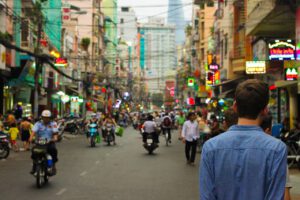By Jacob Wolinsky. Originally published at ValueWalk.

New investor guidance cites human rights risks to brands with relationships connected to Uyghur region in China
[activistinvestinng]
Q2 2020 hedge fund letters, conferences and more
Abuses including widespread forced labor, mass surveillance and internment of Uyghurs in detention camps on the part of Chinese authorities create unacceptable risks for global brands.
Guidance To Help Investors Assess Their Potential Risks
NEW YORK, NY, TUESDAY, AUGUST 4, 2020 – Amid mounting calls from civil society and human rights groups for brands to exit the Uyghur Region in Xinjiang China due to egregious human rights abuses, the Investor Alliance for Human Rights (the Investor Alliance) has published Guidance to help investors assess their potential risks, and tools they can use to engage relevant portfolio companies.
Since 2017, the Chinese government has placed an estimated 1.8 million predominantly Uyghur and other Muslim minorities in detention camps, prisons, and factories in the Xinjiang Uyghur Autonomous Region, also known as East Turkistan. Allegations of forced labor involving Uyghur (Uighur) workers have long been the focus of news reports, and calls for brands to divest from the region are escalating.
A business advisory issued by the U.S. State Department last month cautioned businesses and investors about the reputational, legal, and economic risks of business links to entities that engage in human rights abuses in the Uyghur Region, and a July 23rd call to action endorsed by over 200 organizations including investors, civil society organizations and trade unions, called for apparel brands to stop sourcing from the region due to the near certainty of forced labor.
“Since the concentration camps were established in 2017, millions of Uyghur detainees face brainwashing, torture, murder, rape, sterilization and organ theft, and those of us in exile have been forced to cut off contact with our families,” said Rahima Mahmut, U.K. Project Director, World Uyghur Congress. “We expect the companies whose supply chains are contaminated by the abuse of slave labor to show their solidarity with us by moving their supply chains out of the region.”
Risks Associated With Connections To The Uyghur Region
Grounded in international standards including the Universal Declaration of Human Rights and the UN Guiding Principles on Business and Human Rights (UNGPs), Human Rights Risks in Xinjiang Uyghur Autonomous Region: Practical Guidance (the Guidance) informs investors of the salient risks to people associated with the business activities of their portfolio companies in or connected with the Uyghur Region. It provides practical guidance to investors on how to engage with their portfolio companies, as well as other stakeholders, to identify, prevent and mitigate those risks, at different stages of the business process or product lifecycle.
“We are pleased with this practical guidance for investors on the human rights risk in the Xinjiang, Uyghur Autonomous region,” said Arthur van Mansvelt, Senior Engagement Specialist, Achmea Investment Management. “As a member of the Investor Alliance, Achmea views this Guidance as a very useful basis for further collaborative investor action to address this complex case of human rights abuse.”
While tech and apparel brands are being especially scrutinized due to value chains connected to mass surveillance and forced labor, multiple sectors are at risk including agriculture, automotive and extractives.
“Institutional investors have a responsibility to address these egregious human rights harms to the Uyghur people, present in their investment supply chains,” said Anita Dorett, Associate Program Director for the Investor Alliance and principal author of the Guidance. “As the Chinese authorities are responsible for these human rights violations, the Guidance advocates that investors need to collaborate with other stakeholders including civil society to use their collective leverage to influence companies, governments and international organizations to take action to prevent these harms, otherwise it is incumbent on investors to take steps to end their investment relationships.”
Investor Guidance For Human Rights Risks
This Guidance comprises several areas of focus:
- Human Rights Due Diligence and the challenges of applying commonly-used methods of human rights due diligence to business activities in or connected with the Uyghur Region.
- Assessing Exposure and Engaging with Portfolio Companies during investment decision-making processes and throughout the investment lifecycle for salient human rights risks.
- Guiding Questions for Investors to address with portfolio companies in order to evaluate efforts to conduct human rights due diligence and to address and manage actual or potential human rights risks in their operations and value chains, connected to the Uyghur Region.
- Collaborative Action with other investors, civil society stakeholders, international organizations, and policymakers as likely the most effective way to amplify investor leverage to encourage companies to take action to address systemic human rights harms.
“For too long global companies have dismissed the ongoing human rights crisis in the Uyghur Region solely for the benefit of having access to cheap labor,” said Shoko Sekiguchi, Senior Responsible Investment Research Associate at Domini Impact Investments. “This timely Guidance offers investors a new set of perspectives and practical engagement strategies to redress the exploitation of the Uyghur people and to help create more sustainable and equitable societies.”
For more information, please contact Anita Dorett at adorett@iccr.org.
About the Investor Alliance for Human Rights
The Investor Alliance for Human Rights is a collective action platform for responsible investment that is grounded in respect for people’s fundamental rights. Its members include asset management firms, public pension funds, trade union funds, faith-based institutions, family funds, and endowments. Collectively, they represent nearly US$5trillion in assets under management and 19 countries. The Investor Alliance is an initiative of the Interfaith Center on Corporate Responsibility.
Visit our website at: https://investorsforhumanrights.org/ and follow us on Twitter: @InvestForRights
The post Human rights risks to brands connected to Uyghur region appeared first on ValueWalk.
Sign up for ValueWalk’s free newsletter here.



